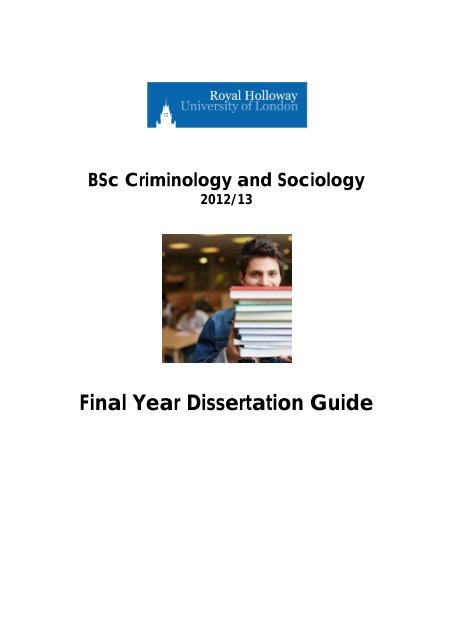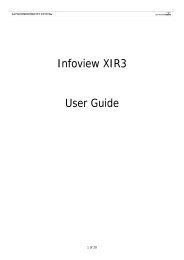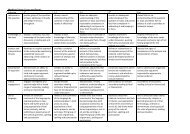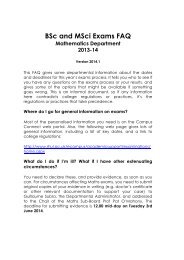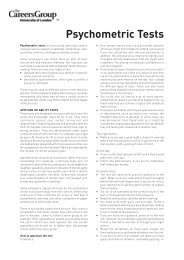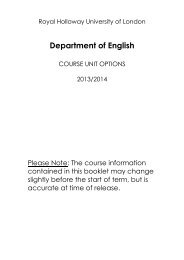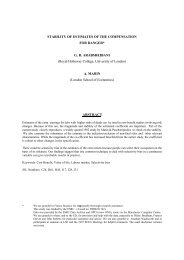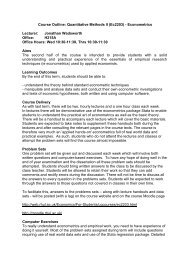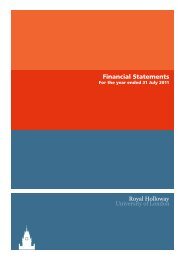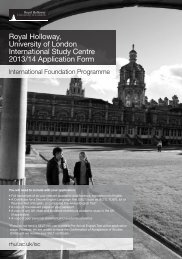Final Year Dissertation Guide
Final Year Dissertation Guide
Final Year Dissertation Guide
Create successful ePaper yourself
Turn your PDF publications into a flip-book with our unique Google optimized e-Paper software.
BSc Criminology and Sociology<br />
2012/13<br />
<strong>Final</strong> <strong>Year</strong> <strong>Dissertation</strong> <strong>Guide</strong>
Table of Contents<br />
Introduction ....................................................................................................... 3<br />
1. Course Aims and Learning Outcomes ...................................................... 3<br />
2. Supervision ..................................................................................................... 4<br />
3. Research Ethics ............................................................................................. 4<br />
4. <strong>Dissertation</strong> Length ....................................................................................... 4<br />
5. Managing Your Time .................................................................................... 5<br />
6. <strong>Dissertation</strong> Structure ................................................................................... 5<br />
7. Referencing ................................................................................................... 7<br />
8. Plagiarism ....................................................................................................... 8<br />
9. Presentation .................................................................................................. 8<br />
10. Submitting Your <strong>Dissertation</strong> ..................................................................... 8<br />
11. Penalties ....................................................................................................... 9<br />
12. Extensions ..................................................................................................... 9<br />
13. Further Information ................................................................................... 10<br />
2
Introduction<br />
In the third year of your degree course you are required to write a<br />
dissertation of between 10,000 and 12,000 words in length. This<br />
dissertation is equivalent to one full Course Unit and is therefore a<br />
quarter of your final years work.<br />
The dissertation is an opportunity for you to examine, in depth, an area<br />
of interest to you. It is one of the most important pieces of work you will<br />
do as an undergraduate. It shows the extent that you are an<br />
independent learner and scholar.<br />
You will be allocated a member of staff as your supervisor. The role of<br />
the supervisor is to help and guide you with your dissertation. However,<br />
the choice of dissertation topic, the research methodology and the<br />
actual work are up to you.<br />
The dissertation is assessed on the basis of the quality of scholarship it<br />
demonstrates. Markers will look for your knowledge of the subject<br />
matter, evidence of independent thought and the clarity with which<br />
you present your ideas.<br />
This document contains information regarding the dissertation aims,<br />
structure, presentation, submission requirements and penalties. It should<br />
be read in conjunction with your departmental student handbook and<br />
College Academic regulations:<br />
http://www.rhul.ac.uk/criminologyandsociology/informationforcurrents<br />
tudents/home.aspx<br />
http://www.rhul.ac.uk/forstudents/studying/academicregulations/hom<br />
e.aspx<br />
1. Course Aims and Learning Outcomes<br />
The aims of the dissertation are:<br />
1. To enable students to demonstrate their skills as independent<br />
learners;<br />
2. To give students the opportunity to research a topic in an area of<br />
Sociology or Criminology in detail to a higher level;<br />
3. To provide an opportunity to submit a substantial piece of written<br />
work.<br />
The learning outcomes of the dissertation are:<br />
3
By the end of the doing the dissertation a student will have:<br />
1. Shown that they are an independent learner;<br />
2. Researched a topic to a higher level;<br />
3. Submitted a substantial piece of written work;<br />
4. Shown that they can critically reflect on established literature;<br />
5. Shown indications of original thought.<br />
2. Supervision<br />
The role of the supervisor is to help guide you through the key stages of<br />
the dissertation. This includes advice about the suitability of a topic;<br />
about appropriate reading; the structure and organisation of the<br />
dissertation and the way in which it should be presented.<br />
You should meet with your supervisor once a term to discuss progress. It<br />
is your responsibility to contact your supervisor to arrange meetings.<br />
Please remember your supervisor is a busy academic and you need to<br />
contact your supervisor in plenty of time to arrange a meeting to<br />
discuss your dissertation.<br />
Supervisors can read and provide feedback on two chapters of a draft<br />
dissertation provided they are received before Wednesday on week<br />
eight of the spring term. It is highly recommended that you construct a<br />
detailed plan of your dissertation and discuss this with your supervisor. It<br />
is also advisable to show your supervisor your bibliography.<br />
3. Research Ethics<br />
Students undertaking empirical work involving data collection directly<br />
from research participants (observations, interviews, questionnaires,<br />
group discussions, recordings, videos, etc) must receive ethical<br />
clearance before proceeding with their research. It is the joint<br />
responsibility of the student and the supervisor to ensure that such<br />
clearance has been obtained. The first step in this process is<br />
completion of the College’s Simplified Ethical Approval Form. These<br />
forms provide the basis for a decision to proceed to any or all of the<br />
following: departmental ethical review; review by Royal Holloway<br />
Ethics Committee; review by a Local or Multiregional Research Ethics<br />
Committee (LREC or MREC).<br />
4. <strong>Dissertation</strong> Length<br />
<strong>Dissertation</strong>s must be within 10,000-12,000 words, including footnotes,<br />
4
citations, and tables, but excluding appendices and bibliography. Part<br />
of the exercise of the dissertation is to produce a piece of good quality<br />
work of a specific length. Penalties will be applied to dissertations that<br />
are more than 12,000 words in length (see Section 11).<br />
5. Managing Your Time<br />
Writing a good dissertation takes a considerable amount of time. You<br />
will produce a number of drafts leading up to the final version. It is<br />
recommended that a draft of the dissertation should be completed by<br />
the start of the second term of third year. It is essential that you<br />
substantially complete the dissertation by half-way through the second<br />
term in order to allow sufficient time for typing, checking for errors, lastminute<br />
problems, etc. You must recognise that by this stage there will<br />
not be time for any substantive content changes.<br />
6. <strong>Dissertation</strong> Structure<br />
The structure of the dissertation relates to the specific kind of<br />
dissertation you are doing. The information below is intended as a<br />
starting point and a general guide. Having read this information, it is<br />
recommended that you construct a plan specific to your dissertation<br />
and discuss this with your supervisor.<br />
The Front Page<br />
This should be similar to the one for essays, refer to 9 c) for guidance on<br />
presentation and requirements.<br />
An Abstract<br />
Summarise your dissertation here in 300 words or less. Try to provide an<br />
accurate idea of what the key issues, themes and debates are that<br />
you are considering, the ways in which you have considered them and<br />
any core findings that have emerged through your enquiry.<br />
Contents Page<br />
A clear, neatly laid out list of the contents signals a well-organised<br />
product. Take time to ensure that each chapter is listed along with subheadings<br />
where relevant.<br />
The Chapters in a Research–Based <strong>Dissertation</strong><br />
Usually you will want to include (as a minimum) the following:<br />
Introduction<br />
The introduction will give the reader a beginning account of what you<br />
have chosen to examine and why you have chosen to do so. It also<br />
5
states how you intend to proceed, and what the rest of the chapters<br />
basically contain.<br />
Literature Review<br />
As for an essay, but with greater depth and breadth, you will tell the<br />
reader what the key issues are that you are addressing, and why it is<br />
from your point of view that they are addressed in the way that they<br />
are here. You will map out what is known, what is emerging, and any<br />
areas that remain unknown or under explored in relation to the issues<br />
you have identified. You will need to demonstrate your ability to<br />
compare, analyse and/ or critically synthesise the current literature.<br />
Don’t just list all the different studies and their findings in your area of<br />
interest. Let the reader know which ones are important to your<br />
research and how you can use the knowledge gained from past<br />
research to help you with your study. Because of the relatively short<br />
word length for a BSc dissertation, try and be precise about your focus.<br />
Shine your light brightly on a small area of your interest, rather than<br />
attempting to cast a more diffuse light over a bigger area. Summarise<br />
the chapter by identifying the key issues, and by briefly pointing to how<br />
they connect to the next chapter.<br />
Methodology<br />
Here you are making a credible case for the methods you will employ<br />
to examine the issues that emerged during the literature review. Begin<br />
the chapter with a statement of what kind of research design you will<br />
be using and then follow this up with an explanation for choosing this<br />
design. Then go on to do the same for the methods, including the<br />
reasons for discarding other methodological approaches in favour of<br />
the one(s) you chose. Describe your sample of respondents and their<br />
contexts. Give an account of any ethical issues you encountered and<br />
how you responded to these. Say how your research design helped or<br />
obstructed the process of gathering data, and any ways in which<br />
expected and unexpected things happened during the enquiry.<br />
Similarly, give an account of how you analysed the data, and any<br />
ways in which you think this was fruitful or limited (ending on a positive<br />
note).<br />
Results<br />
Begin by summarising the results briefly, so that it creates a foundation<br />
for what you are about to lay out in more detail. Then you can begin to<br />
systematically compare and contrast your local findings with the key<br />
issues identified in the literature review. You may find it helpful to<br />
structure the results using the key issues as sub-headings.<br />
Data Analysis<br />
When collecting data, data analysis is a separate section. In this<br />
section you explain your findings. Say what your results confirmed, and<br />
6
how they differed from the literature. Synthesise and evaluate, adding<br />
your own balanced views, and drawing the chapter down to a<br />
comprehensive set of statements that make a bridge between the<br />
literature and your own findings.<br />
Conclusion<br />
Say what your findings are and why you think they are of significance.<br />
Give an honest appraisal of the strengths and limitations of the<br />
methods of enquiry, once again trying to end on a positive note.<br />
Always try to let the reader know that you are aware that your<br />
research has some limitations, but that it also adds to the existing body<br />
of knowledge in whatever field you decide to research. And finally,<br />
state where you or other researchers should go from here. Point the<br />
way.<br />
The Chapters in a Literature-Based <strong>Dissertation</strong><br />
For a literature review-based dissertation you should include an<br />
abstract, contents page and introduction as above. You should<br />
explain the process of conducting the searches for your literature<br />
review, providing a brief description of databases searched, key words<br />
used and an account of the searches generated and how you<br />
proceeded to organise and analyse this material. This account could<br />
be placed towards the end of your introduction or as a separate<br />
methodology section, depending on what works best for your<br />
particular dissertation. The main sections of your dissertation need to be<br />
organised in a logical manner, for example this may be chronologically<br />
or thematically. You should discuss with your supervisor the most<br />
appropriate structure for your particular dissertation. As above, your<br />
dissertation should conclude by summarising the significance of your<br />
findings and pointing the way for other scholars.<br />
<strong>Final</strong>ly: A full and accurate bibliography that lists all the sources cited in<br />
the dissertation must be provided. Some dissertations also include<br />
appendices, but this is not compulsory.<br />
7. Referencing<br />
You must use the Harvard referencing system. Further guidance is<br />
available here:<br />
http://www.rhul.ac.uk/criminologyandsociology/informationforcurrents<br />
tudents/home.aspx<br />
7
8. Plagiarism<br />
All College regulation relating to plagiarism, including self-plagiarism<br />
applies to the dissertation. See the Student Handbook for further<br />
information.<br />
http://www.rhul.ac.uk/criminologyandsociology/informationforcurrents<br />
tudents/home.aspx<br />
9. Presentation<br />
<strong>Dissertation</strong>s MUST:<br />
a) Be typed with double spacing and margins of at least 1 inch on<br />
either side, and have page numbers;<br />
b) Use Arial or Times New Roman font in size 12.<br />
c) Be bound in some form i.e. a spiral/comb binder or similar but not<br />
in a folder;<br />
d) Include the white and pink copies of the submission form which<br />
can be collected from the departmental office. These should be<br />
at the front of the document;<br />
e) Have:<br />
• The Programme title<br />
• Your candidate number (do not display you name anywhere<br />
on the document)<br />
• The course code for the dissertation CR3011<br />
• The title of the dissertation<br />
• The name of the dissertation supervisor<br />
• The exact word length<br />
f) Contain adequate and proper references and bibliography (see<br />
referencing above).<br />
10. Submitting Your <strong>Dissertation</strong><br />
You are required to submit your dissertation through Turnitin and two<br />
hard copies to the Departmental Office before the 12:00 midday<br />
deadline as stated in your Student Handbook. Remember that there<br />
will be a large number of students submitting on this day and you will<br />
need to allow plenty of time for printing, binding and completing cover<br />
8
sheets etc.<br />
11. Penalties<br />
Penalties for late submission<br />
The following is the College policy and applies to all students on taught<br />
programmes of study including the dissertation:<br />
All coursework should be submitted by the specified deadline. Please<br />
ensure that you are aware of the deadlines set by your department.<br />
Work that is submitted after the deadline will be penalised as follows:<br />
• For work submitted up to 24 hours late, the mark will be reduced<br />
by ten percentage marks* subject to a minimum mark of a<br />
minimum pass;<br />
• For work submitted more than 24 hours late, the maximum mark<br />
will be zero.<br />
*eg: a mark of 65% awarded would be reduced to 55%<br />
If you have had extenuating circumstances which have affected your<br />
ability to submit work by the deadline, these should be submitted in<br />
writing, accompanied by any relevant documentary evidence, to your<br />
department(s). As with all extenuating circumstances it is the discretion<br />
of the examiners whether to accept these as a reason for having not<br />
submitted work on time.<br />
Penalties for over-length work<br />
In line with college regulations, penalties will be applied for over-length<br />
work. For dissertations which exceed the upper word limit by at least<br />
10% and by less than 20%, the mark will be reduced by ten percentage<br />
marks. For dissertations which exceed the upper word limit by 20% or<br />
more, the maximum mark will be zero.<br />
12. Extensions<br />
For medical or other similar reasons, extensions can only be granted by<br />
the academic coordinator, Dr Richard Smith (r.smith@rhul.ac.uk).<br />
Supervisors cannot grant extensions. If you need an extension, please<br />
complete an extension form and enclose copies originals of medical<br />
certificates and other written evidence to support your request before<br />
9
the submission deadline.<br />
13. Further Information<br />
If you have a question about your dissertation you should speak to your<br />
dissertation supervisor.<br />
The dissertation co-ordinator, Dr Vicki Harman (v.harman@rhul.ac.uk)<br />
can be contacted if further advice is needed regarding the<br />
information contained in this document.<br />
Useful websites with information about researching and writing a<br />
dissertation include:<br />
http://www.socscidiss.bham.ac.uk/<br />
http://www.humanities.manchester.ac.uk/studyskills/assessment_<br />
evaluation/dissertations/definition.html<br />
http://www.rhul.ac.uk/forstudents/studying/studyresources/hom<br />
e.aspx<br />
There are a several books in the library that aim to guide students<br />
through the dissertation process. These include:<br />
Greetham, B. (2009) How to Write Your Undergraduate <strong>Dissertation</strong>,<br />
Basingstoks: Palgrave.<br />
Kirkton, B. (2011) Brilliant <strong>Dissertation</strong>: What You Need To Know and How<br />
To Do It, Harlow: Pearson.<br />
10


